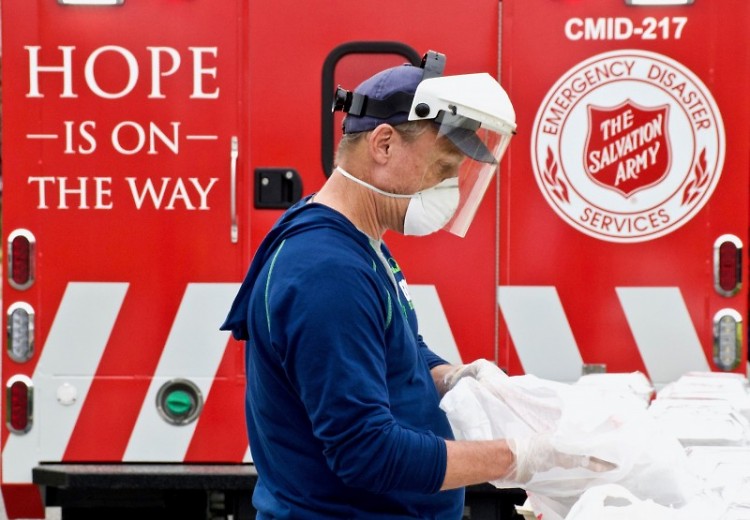As the nation marks the anniversary of the COVID-19 pandemic this month, The Salvation Army of Western Michigan and Northern Indiana continues to address the longstanding issues of poverty, hunger, addiction and homelessness, which have intensified and become more complex due to COVID-19. As a record number of families face the ongoing threats of “pandemic poverty,” The Salvation Army remains committed, despite operational and fundraising challenges for charities.
People living in poverty felt the initial effects of COVID-19 more quickly and acutely because they experienced a pandemic on top of already-existing epidemics of need. COVID-19 forced a record number of Americans to seek assistance from The Salvation Army. That was certainly true in West Michigan, where many sought help from The Salvation Army for the first time in their lives. The most requested service was food assistance, and due to its grassroots structure, The Salvation Army was able to modify operations to meet urgent need in creative and localized ways. From March 2020 – Jan. 2021, 232,041 meals were served across the 26 Corps which comprise the Western Michigan Northern Indiana division, with 9,577 home-delivered meals and 57,135 grocery orders provided. Locally in Kent County, the Fulton Heights Corps Community Center supplied 6,407 meals, majority of which came in a drive-thru fashion to senior citizens, throughout 2020. The Kroc Corps Community Center in Kent County served over 33,000 sack lunches last year and provided nearly 400 boxes of groceries. Through The Salvation Army of Kent County’s pantry, 1,482 households received emergency food assistance.
“We are humbled by the opportunity to come alongside so many of our neighbors during one of the most challenging times in current history,” said Major Glen Caddy, Divisional Commander. “Our many supporters and community partners made it possible for us to provide help, hope, and healing during a dark time. We will continue working to fulfill our promise of Doing the Most Good for those in the most need.”
Because The Salvation Army meets human need on the frontlines, local centers are often the first place people turn to in a crisis. As needs evolved over the course of the year, The Salvation Army continued to reimagine safe ways to address them. Here are some of the ways the organization met the needs in Kent County throughout 2020:
- 1,106 households received emergency utility bill assistance;
- The Salvation Army of Kent County’s Eviction Diversion Program partnered with the Michigan State Housing Development Authority to help keep 820 families safe in their homes through the end of the year;
- 8,864 individuals were provided with housing information and referrals, and 4,364 individuals had their cases directly managed by The Salvation Army in order to maintain or obtain housing;
- The Emotional and Spiritual Care Hotline, which was introduced in April to offer a reassuring voice to those struggling with pandemic-related stress, made 6,216 contacts while dedicating 5,389 hours;
- About 15,000 items of personal protective equipment was collected and donated to the Kent County Sheriff’s Office in March and April;
- Despite facing capacity limitations and other significant pandemic-related obstacles, the Adult Rehabilitation Center helped 198 individuals toward a new start in their time of need and Turning Point Programs aided 991 individuals begin a journey free of addiction and build the foundation for a life of recovery.
To hear more about these programs and how The Salvation Army of Kent County served during the pandemic, the community is invited to virtually attend the seventh annual Red Shield Event: Pivoting Through Adversity with John O’Leary on April 14. National bestselling author and speaker John O’Leary will provide a deeply inspiring message that is timely for the current environment. For more information and to get your tickets, visit salarmy.us/RSE2021.
The Salvation Army nationally took the historic step of starting its 2020 holiday fundraising campaign early to ensure struggling Americans had a bright Christmas. More than $1.5 million was raised in Kent County, which will help power 2021 services, but demand is expected to outpace resources as neighbors face threats of eviction and financial loss. The majority of constituents are characterized to be families who live paycheck to paycheck. In response, The Salvation Army will focus on keeping people in their homes through rent and utility assistance, while continuing its other vital services to the community.
The Salvation Army will continue to meet the rising tide of pandemic poverty during the current crisis and beyond, but to do so, they are asking for the support of the public. Just $25 a month could be the difference between a family paying their light bill or being left in the dark or receiving a hot meal or going hungry. To help, visit SAKentCounty.org.
The Rapidian, a program of the 501(c)3 nonprofit Community Media Center, relies on the community’s support to help cover the cost of training reporters and publishing content.
We need your help.
If each of our readers and content creators who values this community platform help support its creation and maintenance, The Rapidian can continue to educate and facilitate a conversation around issues for years to come.
Please support The Rapidian and make a contribution today.
